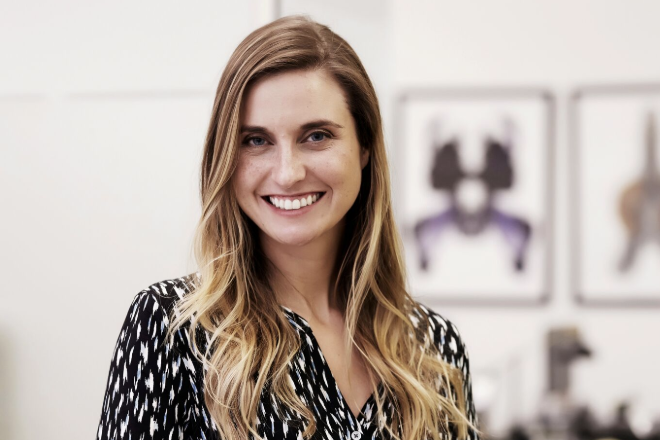Although venture capital funds are making an effort to invest in more female-founded companies and hire more female venture capitalists, there is still a venture capital gender gap. In 2017, only 2.2% of all venture capital in the United States went to companies founded solely by women, only 4.4% of transactions went to female-founded companies and only 11.3% of partners at venture capitalist firms were women, according to Pitchbook data.
Andrea Hippeau, is a principal at the early-stage venture capital fund Lerer Hippeau. The fund has backed the most female-founded companies in the New York metropolitan area since 2006, according to PitchBook data. Their roster of female-founded companies includes LOLA, Glossier, Dia&Co, Birchbox and WayUp. I spoke to Hippeau about her career path, advice for female founders raising capital and how to encourage more women to become the decision-makers.

How did you end up at Lerer Hippeau? What was your career path?
I didn’t get into venture capital right away. I started my career doing corporate sales at Thomson Reuters, which was a great experience. However, I eventually realized that corporate sales was not what I wanted to do for the long-term. At that time, I had an opportunity to go to Advance Publications, a holding company that owned Conde Nast back in 2011. They were looking to diversify their portfolio with tech and digital properties, so they started a $400M fund. I was the fund’s first employee under the senior vice president and our mandate was to do venture-style investing as well as mergers and acquisitions and strategy for the brand, which ended up being how I was initially exposed to so many talented entrepreneurs. I just remember being just blown away by how much they were passionate about their jobs and inspired by all of their energy and excitement. That was when I knew where I wanted to take my career.
I went to Columbia Business School and did an internship at a startup called Bark, which is now Bark & Co. I’m an animal lover and when I started at Bark there were just 10 of us. It was a high-growth and exciting time there. I was at Bark during the rest of business school and when I left, there were over 30 employees.
At that same time, Lerer Hippeau raised their fourth fund and, while I thought this would be a stopover to gain some experience that would eventually lead to an operating role, I’ve now been there for four years and couldn’t be happier on this side of the business.
What do you look for when you are choosing a company to invest in?
Because we primarily focus on early-stage investing, we’re making an investment in people, rather than trying to analyze any kind of metrics. You know that the business is going to change a million times, but at the end of the day, you’re focused on backing really smart and talented people. A founder’s passion for the company is the number one signal that they are the real deal. You can always tell when a founder is solving an issue that they really believe in versus someone who is solely taking advantage of a market opportunity.
What are your three best pieces of advice for founders pitching an early-stage company?
Be yourself. I think founders are often in sales mode, which makes sense because they’re pitching. But at the end of the day, you want to set the stage for the potential to have a long-term relationship with the venture capitalist. So try to relax and be yourself.
Be able to describe your business in one sentence. Practice this elevator pitch and concisely explain what your business can do. Venture capitalists have short attention spans.
Make the venture capitalist pitch you. Remember, this is a long-term relationship – similar to a marriage – so you want to make sure you’re making the venture capitalists pitch you and tell you how they will support you, being financials, just much as you’re pitching them.
What is your best advice for female entrepreneurs raising funding, especially when we know that female founders receive less funding than men and that conscious and unconscious bias contributes to the decision?
For female entrepreneurs, it’s to follow your gut. If you get a bad gut reaction to an investor they’re probably not the right people to get into business with. If you get any sort of bad vibe, it’s best to just walk away. Try to use the fact you’re a female to your advantage, even when it seems insurmountable. Use opportunities directed to you. Take a disadvantage and turn it into an advantage. Seek out female members on the investment team even if they are not at the partner level – they are more influential than you think. When I meet with a female entrepreneur, especially when it is a product or service for women, I can tell that the founder can instantly relax because they don’t have to explain to me how a tampon works (that actually happened with our portfolio company LOLA) or why women love jewelry. It is a great way to get an advocate for your company within the firm.
How do you think we can encourage more women to pursue careers in venture capital so that there is more diversity?
I really believe there need to be more women at the partner level in venture capital. It’s hard for a junior level woman to get excited about a career in venture capital if she doesn’t see career growth there. Funds are starting to promote women, which is great, so hopefully, this is just the beginning.
What are the most important characteristics someone needs to have to be successful in your role?
You definitely need to be extroverted or at least have a part of you that’s an extrovert. So much of the job is meeting other people and networking, so if you’re someone that’s turned off by that, it can be exhausting and draining if you don’t have the right mentality and make it a priority.
Being a self-starter is also really important. It takes so long to figure out if an investment you made is good or not. You have to be confident in yourself, your instincts and your work. If you need a lot of feedback and metric-driven goals, venture capital investing is probably not the right job for you.
What is one thing that you wish you had known when you were starting out your career?
I wish I had known how often you have to say “no” and pass on a potential opportunity. It seems like a glamorous job when you’re meeting with and funding these new disruptive companies and talented entrepreneurs – and it is a good portion of the time. We see the majority of New York early-stage companies – which is a big pool of talent to choose from. So in reality, I spend most of my time saying “no” to founders. When you’re telling someone you’re passing on funding their company, you have to have the conviction to believe in yourself and trust that you’re making the right decision for the right reasons.
What’s the biggest lesson you learned at work and how did you learn it?
It was with the very first investment that I personally brought to the team. It turned out that the founders were fraudulent! I was super trusting of everything they were saying. I learned quickly that, while you want to put your faith into the founder and also trust your instincts, you also need to put in the work yourself and do your due diligence.
What is the best advice you’ve ever received?
The best piece of advice I’ve ever received was from our managing partner, Kenny Lerer. When I was beginning my career, I was about to start my job at Thomson Reuters, and because he was helping me with my job search, he gave me a call. At the time I was shopping for new work clothes at J.Crew. He told me, “This job isn’t going to work out if you have to change your wardrobe. You shouldn’t have to pretend someone you’re not.”
This stuck with me and it couldn’t be truer. It’s those jobs where you don’t have to buy new clothes – or change who you are – that are the most fulfilling.
What is your career advice for other young professional women?
Don’t change who you are because you think that’s what is expected of you. If we were all truer to ourselves, we’d all be a bit better off.































